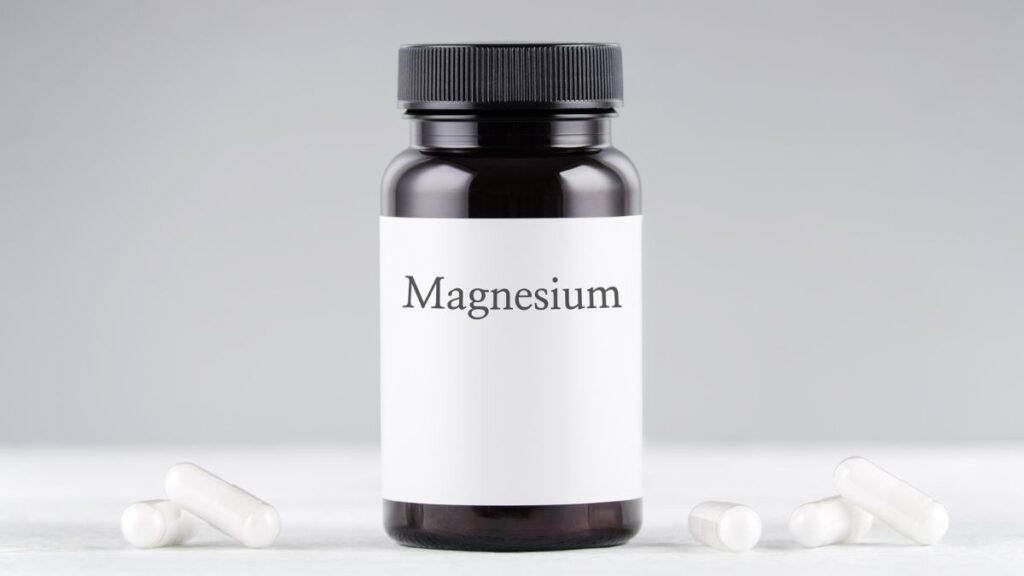
Magnesium is one of the most abundant minerals in the human body, yet many people don’t get enough of it through their daily diet. Among the various forms of magnesium supplements available, magnesium glycinate has gained attention for its unique properties and potential benefits. This chelated form of magnesium offers superior absorption compared to other types, making it an appealing option for those looking to support their overall health.
Understanding what magnesium glycinate is and how it works in your body can help you make informed decisions about your nutritional needs. From supporting muscle function to promoting bone health, this essential mineral plays numerous roles in maintaining your wellbeing.
Understanding Magnesium Glycinate
Magnesium glycinate is a chelated form of magnesium, meaning the mineral is bound to glycine, an amino acid. This binding process creates a more stable compound that your digestive system can absorb more efficiently than other forms of magnesium.
The chelation process protects the magnesium from interfering with other minerals and reduces the likelihood of digestive upset that sometimes occurs with other magnesium supplements. Glycine itself is the smallest amino acid and acts as an inhibitory neurotransmitter, which may contribute additional calming effects.
This form of magnesium is often preferred by healthcare practitioners because it tends to be gentler on the stomach and provides better bioavailability. The molecular structure allows it to pass through the intestinal wall more easily, ensuring your body can actually use the magnesium you’re consuming.
The Science Behind Muscle Relaxation
Magnesium glycinate plays a crucial role in muscle function throughout your body. At the cellular level, magnesium acts as a natural calcium blocker, helping muscles relax after they contract. When you have adequate magnesium levels, your muscles can properly cycle between contraction and relaxation.
This mineral is involved in the regulation of muscle and nerve function by supporting the proper balance of electrolytes. Magnesium helps facilitate the movement of calcium and potassium ions across cell membranes, which is essential for normal muscle function.

The glycine component may provide additional benefits for muscle relaxation. As an inhibitory neurotransmitter, glycine can have a calming effect on the nervous system, potentially supporting the body’s natural relaxation processes.
Many people find that maintaining adequate magnesium levels helps with muscle comfort, particularly after physical activity or during periods of stress. The mineral supports the normal recovery process that muscles undergo during rest periods.
Supporting Cardiovascular Health
Your heart is essentially a muscle, and magnesium glycinate plays an important role in supporting cardiovascular function. This mineral helps maintain the electrical activity that keeps your heart beating in a steady rhythm.
Magnesium is involved in over 300 enzymatic reactions in the body, many of which are related to cardiovascular health. It supports the proper function of the smooth muscles in blood vessels, helping maintain healthy circulation.
The mineral also plays a role in supporting healthy blood pressure levels that are already within the normal range. Magnesium helps regulate the balance of other minerals like calcium, sodium, and potassium, which are all important for cardiovascular function.
Research has shown that people with higher magnesium intake often have better cardiovascular health markers. The bioavailable nature of magnesium glycinate makes it an efficient way to support your body’s magnesium needs for heart health.
Nerve Function and Nervous System Support
Magnesium glycinate is essential for proper nerve function throughout your body. The nervous system relies on magnesium to transmit signals between nerve cells and to maintain the electrical charge across nerve membranes.
This mineral helps regulate neurotransmitter activity, supporting the communication between nerve cells. Magnesium is particularly important for the function of GABA receptors, which are involved in promoting relaxation and reducing nervous tension.
The glycine component adds another layer of nervous system support. As an inhibitory neurotransmitter, glycine helps balance excitatory signals in the brain, contributing to a sense of calm and relaxation.
People often notice that maintaining adequate magnesium levels helps them feel more balanced and better able to handle daily stressors. The mineral supports the body’s natural stress response systems, helping maintain equilibrium during challenging times.
Building and Maintaining Strong Bones
While calcium gets most of the attention for bone health, magnesium glycinate is equally important for building and maintaining strong bones. Approximately 60% of the body’s magnesium is stored in the bones, where it plays several critical roles.
Magnesium is necessary for the proper metabolism of calcium and vitamin D, two other nutrients essential for bone health. Without adequate magnesium, your body cannot effectively use these nutrients, regardless of how much you consume.
The mineral is also involved in bone formation at the cellular level. Magnesium supports the activity of osteoblasts, the cells responsible for building new bone tissue. It also helps regulate parathyroid hormone, which controls calcium levels in the blood and bones.
As you age, maintaining adequate magnesium levels becomes increasingly important for preserving bone density and strength. The superior absorption of magnesium glycinate makes it an effective option for supporting long-term bone health.
Absorption and Bioavailability Advantages
One of the main advantages of magnesium glycinate over other forms of magnesium is its superior absorption rate. The chelated structure protects the magnesium from binding with other compounds in your digestive system that could interfere with absorption.
Other forms of magnesium, such as magnesium oxide, have much lower absorption rates and can cause digestive discomfort in some people. Magnesium glycinate typically doesn’t have these issues because the amino acid chelation makes it more compatible with your digestive system.
The bioavailability of magnesium glycinate means that more of the magnesium you consume actually reaches your cells where it can be used. This efficiency allows for effective supplementation with smaller doses compared to less absorbable forms.
The gentle nature of magnesium glycinate also means it can be taken on an empty stomach without causing irritation, making it convenient to incorporate into your daily routine.
Who Might Benefit from Magnesium Glycinate
Magnesium deficiency is more common than many people realize, with some estimates suggesting that a significant portion of the population doesn’t get adequate amounts from their diet alone. Certain groups may be at higher risk for low magnesium levels.
Athletes and people who engage in regular intense exercise may have increased magnesium needs due to losses through sweat and the increased metabolic demands of physical activity. Older adults may also benefit from magnesium glycinate supplementation as absorption efficiency can decrease with age.
People following restrictive diets or those with digestive issues that affect nutrient absorption might find it challenging to maintain optimal magnesium levels through food alone. In these cases, the superior bioavailability of magnesium glycinate can be particularly beneficial.
Individuals dealing with high levels of stress may also have increased magnesium needs, as stress can deplete the body’s magnesium stores more quickly than normal.
Making Magnesium Glycinate Work for You
The timing and dosage of magnesium glycinate can affect how well it works for you. Many people find that taking it in the evening supports relaxation and helps prepare the body for rest. However, it can be taken at any time of day that fits your routine.
Starting with a lower dose and gradually increasing allows your body to adjust and helps you determine the optimal amount for your individual needs. It’s always wise to consult with a healthcare provider before starting any new supplement regimen, especially if you have existing health conditions or take medications.
Consistency is key when it comes to magnesium supplementation. The benefits typically become more apparent with regular use over time, as your body’s magnesium stores gradually replenish.
Combining magnesium glycinate with a balanced diet rich in magnesium-containing foods like leafy greens, nuts, seeds, and whole grains can provide comprehensive nutritional support.
Supporting Your Health Journey
Magnesium glycinate offers a highly bioavailable way to support multiple aspects of your health, from muscle function and cardiovascular wellness to nerve health and bone strength. Its superior absorption and gentle nature make it an accessible option for most people looking to optimize their magnesium intake.
Understanding the science behind how magnesium works in your body empowers you to make informed decisions about your health. Whether you’re an athlete looking to support recovery, someone dealing with daily stress, or simply wanting to maintain optimal wellness, magnesium glycinate provides targeted nutritional support.
Consider speaking with a healthcare professional about whether magnesium glycinate supplementation might benefit you. They can help determine if you’re getting adequate magnesium from your current diet and lifestyle, and guide you toward the most appropriate approach for your individual health goals.












